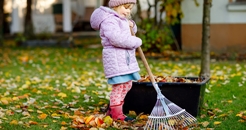 Your toddler was born to help
Your toddler was born to help
From an article by Bold
The next time you’re around a toddler you know, try this simple mini experiment; purposely drop something on the floor near them but act as though it were an accident. Perhaps exclaim. "Oh no!". Next, observe how they respond. Chances are, the toddler will notice what happened, understand it was an accident, and instinctively pick up the dropped object to hand back to you, as researchers have replicated numerous times in a range of scenarios. They will even do this for strangers.
Most parents will agree that they want children to help around the house – and yet this is often a struggle, especially in the teenage years. Research suggests that all children are naturally helpful, and parents play a crucial role in keeping it this way. I remember my son toddling over to fetch a cloth when I spilled something, without even being asked. He didn’t mop it up perfectly, but respecting his intention to help is more important than you might think.
Kids who are rewarded with a toy for their help are less likely to help subsequently without a reward, while those who are not given a reward are more likely continue to act helpfully. Kids can also detect when help is actually needed – if they observe that an object is dropped on purpose, for example, they are not as likely to help.
This body of research suggests that our desire to help each other is a natural impulse. Indeed, it is an extremely important trait for our species. In many ways our success depends on how cooperative we are in groups – helpful behaviour is crucial for group cohesion. Moreover, two-year-olds display helpful behaviour even if their parent or caregiver is not there to observe it, suggesting that helpful behaviour is “spontaneous and intrinsically motivated”, the authors of one study report.
Of course, when kids are young, daily household tasks are often easier without their help because of the inevitable mess they create. Anthropologists and sociologists make a compelling case as to why we not only need to let this helpful behaviour continue, but should encourage it as early as possible. The caveat is that it has to be real help, or else it could later backfire.
Researchers have noted that parents in the Western world often allow their children to pretend to help, giving them ‘mock work’. For instance, children sweep with a child-sized brush and the parents sweep properly afterwards. Or children mix pretend cake mix in a small bowl, allowing mum or dad to finish making the real cake. Children are intuitive, though, and it can become apparent to them that mock work is not truly helpful.
Anthropologists have observed that young children in many non-Western societies contribute to tasks in a meaningful way that is appropriate to their age. Children help with many aspects of daily life, for example by cutting meat or fish with a real knife from age three, tidying, and watching siblings. In many Western households, children play with wooden toy knives, cutting toy apples rather than the real thing. There is a much starker division between adulthood and childhood.
Children need to be closely supervised when helping with food preparation until they have learnt to help safely. However, anthropological research suggests that we should not infantilise children, either. Anthropologist David Lancy links the help-avoidant behaviour of teens directly to early extinguishing of children’s natural helpfulness. Usually, parents don’t mean to – the mock work, sticker charts, and payment for chores are intended to do the opposite.
All this goes to show that any incentive beyond an intuitive desire to help diminishes helpfulness, even though children are clearly born helpers. Letting them help more often may be messier and slower, but it could have lasting benefits, promoting more helpful behaviour as they grow older.
Read the full article here.
Retweet about this article:
From an article by Bold, 13/12/2023